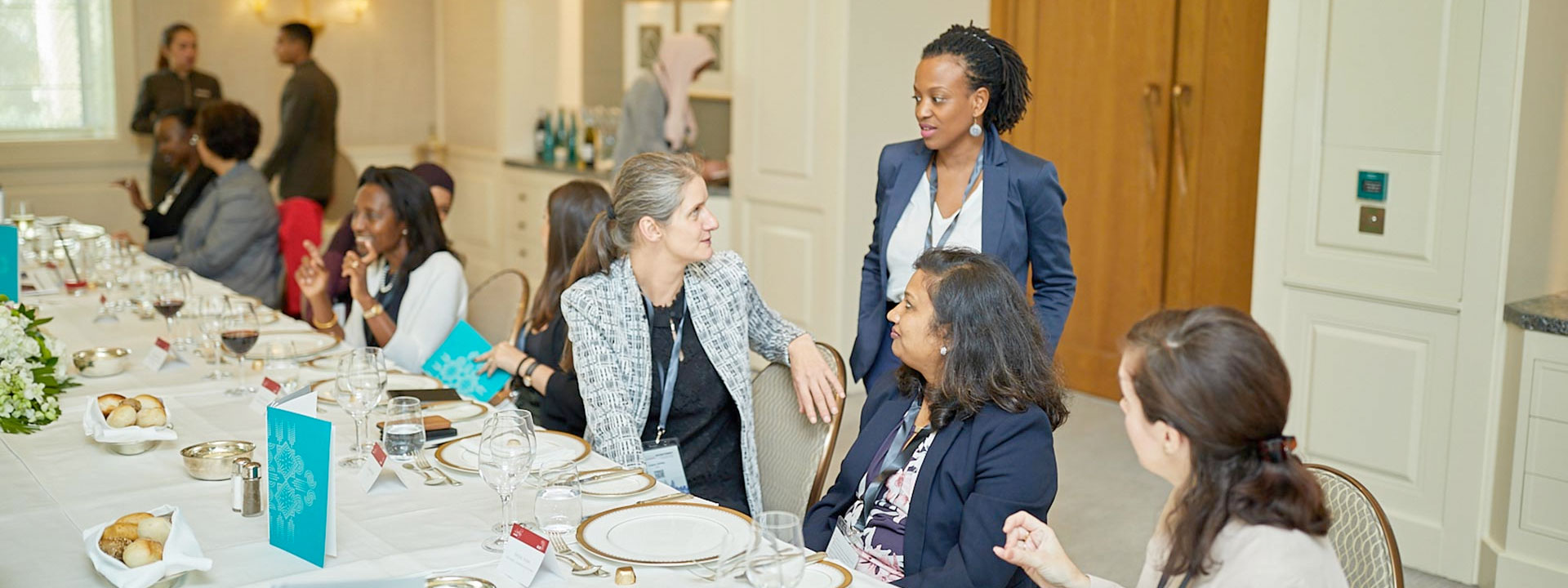
In a professional arena, compared to men, women still have limitations in promotions that prevent them from growing in their professional careers1. The concept of glass ceiling appeared in the decade of the 80’s and is nowadays used as a very powerful metaphor in gender studies; it represents that invisible barrier that many of us have felt at some point in our lives. Are we cracking the glass ceiling? Is it harder for us than for men?
In this discussion, it is inevitable to talk about gender quotas as a mechanism to promote equal representation and to help women achieve higher positions, especially in government matters in which for historical reasons men have held the majority of leadership roles. Quotas were introduced as a mechanism to fight limitations around women empowerment and as a way in which countries try to embrace representation from different groups within society. As discussed during the Luncheon, the imposition of quotas has its advantages and disadvantages, with its supporters and detractors. While it is not a definite solution, many think the measures help address the problem.
In France, for example, which is one of the countries that has fought more strongly for gender parity and where gender quotas are established, women represent 40% of the National Assembly2. In the UK there is a voluntary system of quotas which nowadays translates into 32%3 female representation in the House of Commons. The European Union has been fighting to increase participation of women in company boards to promote gender equality in executive senior positions.
Some argue that although gender quotas may make some people believe that a woman is only there because of the quota, the system is a valid way to improve the situation and to allow women to professionally grow. Others argue that while there is nothing to be ashamed of in taking advantage of a quota, we don’t want to fill a job only as part of a quota, and we need to work hard to deserve the role.
During the Luncheon it was pointed out that gender inequality is both a worldwide problem, as well as very culture-specific. It was interesting to observe different country perceptions around gender issues.
For example, in Morocco, the female working rate is less than 20%4. Women don’t want to work. Instead, they focus on getting married. One reason could be that they don’t have role models. Anecdotally, one important reason why women in Morocco don’t break the glass ceiling is because they don’t apply for jobs unless they are 100% certain that they fit the role.
Some women think that the situation in Kenya is very different from the one described in Morocco; many women are increasingly saying that they don’t want to get married, they see marriage as a barrier to achieving what they want to achieve.
Others are hopeful about the UAE as they see a shift even in the most traditional families. Women are beginning to value education; they want to go out and work.
At a superficial level, the United States seems to be doing well on gender equality but at a practical level there is still a lot that needs to be done. For example, more women than men are graduating from law schools, but women are not getting promotions. With no mentors or other opportunities and as they face difficulties around childcare and household duties, women tend not to aggressively pursue career advancement.
As a woman, it is important to know from the inside where you want to go and to set your goals based on these objectives. Different challenges are presented depending on your industry. We also need to look at our skills: am I the best person for the job? And we need to involve men by educating them on gender matters. If we only involve women in our discussions we are just speaking to ourselves, even if at the end of the day we must take ownership of the journey.
Sometimes we are the ones who saddle ourselves with an unmanageable number of duties and roles. We need to reflect on what it means to be a woman, and this is an individual issue. We must ensure that we have a system that allows us the flexibility to succeed. Some believe that we can have it all and that we don’t have to choose. For others, we need to choose our priorities as we might not get promoted as quickly but we need to make a choice. Perhaps it’s alright to look for a balance, to not be a superwoman and to not always try to crack the glass ceiling. We all have different identities, goals and there is no particular way to do things. The message for our daughters is “you will rise as high as you esteem”.
1“Despite significant normative advances, progress for women and girls remains uneven and slow. No country has fully achieved gender equality and the empowerment of women and girls. Based on the current rate of progress, it will take 82 years to close the gender gap in political participation, 95 years to achieve gender parity in lower secondary education, and 170 years to close the economic gender gap” UN-Women, Strategic Plan 2018-2021, Page 7, http://undocs.org/en/UNW/2017/6/Rev.1
2Idea: “Gender Quotas Data Base, France”, 7 of December. Retrieved from https://www.idea.int/data-tools/data/gender-quotas/country-view/86/35
3Idea: “Gender Quotas Data Base, UK”, 7 of December. Retrieved from https://www.idea.int/data-tools/data/gender-quotas/country-view/137/35
4Trading Economics: “Morocco – Employees, industry, female (% of female employment)”, 6 of December. Retreived from https://tradingeconomics.com/morocco/employees-industry-female-percent-of-female-employment-wb-data.html

On this topic, we addressed two main issues: the recruiting process and gender policies within organisations. If you are recruiting, you need to be flexible to get the best talent. The cost of focusing on 24/7 work means you lose good talent. Flexibility is crucial, especially when you can offer that to someone who is brilliant. Companies are maturing to provide flexibility to retain staff and women definitely will benefit from this. Leading women are choosing their staff based on excellence and not on gender.
Some argue that there are still challenges between job policies and reality. Therefore, dialogue and understanding of your organisation’s culture are key in building trust between employer and employee. Women are still seen as weak when they take advantage of flexi hours and maternity leave and they might get punished by getting irrelevant work for actually taking advantage of the policies.
Dialogue between employer and employee is very important: as an employee, you must build trust so that the employer understands that you are still capable of doing the big jobs. Lots of companies have good policies, even for men. In most of the cases, the men don’t use them, precisely because they don’t want to look weak. People’s perceptions are the problem, you might get judged as a mother/woman/Muslim, etc. You need to understand the culture of the decision-makers in your organisation. It might be hard to have an open conversation with your employer but you need to try to discuss what they require from you, what you require from the organisation and how you plan to achieve your professional goals.
Policies are there for women and they have to make them work. Every organisation must get to a point where they realise that having diversity, including women, is good for the organisation. Women need to beat the drum as this is an ongoing war. Maybe we can help the next generation win the war. Women should be able to set terms with their employer but not based on the fact that they are women but based on the fact that they are exceptionally good at what they do.

We have extracted some key powerful messages from the above discussions that we should all keep in mind
Always be hard working, diligent, invest in yourself, be good at what you do, make sure that you strive to become the best person for the job, irrespective of gender.
For us as women it is really valuable to engage and to have the opportunity to share our experience in these discussions and we hope to continue to host these events. Thank you all for participating in this luncheon and for sharing with us your views on gender equality.
We hope to see you soon in a next Leading Women event!
For more information about the Conference and our future events please contact alnevents@africalegalnetwork.com
* The above summary is a reflection of various personal opinions expressed during a closed luncheon, and does not necessarily reflect the views of ALN or any other organisation represented at the luncheon.